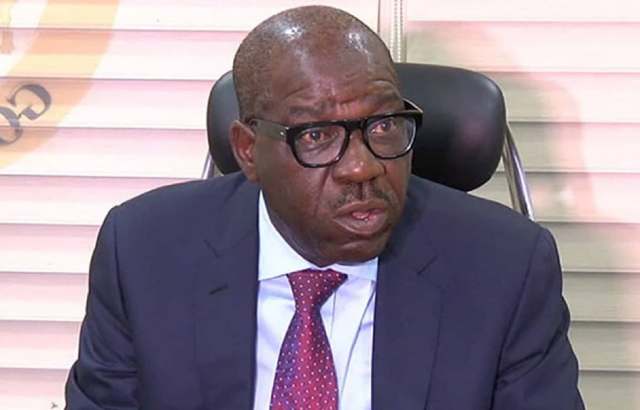By CRUSOE OSAGIE
One year after taking office, the Edo State Government under Governor Monday Okpebholo appears to be rediscovering itself. The government has quietly begun retracing its steps and restoring the very initiatives it once dismantled. In what now seems like a reluctant awakening, it has started to re-enact key reforms initiated under the Godwin Obaseki-led administration, most notably in the education sector.
Towards the end of November 2024, the Okpebholo administration took a sledgehammer to the transformational structures it inherited. Systems that had repositioned Edo State as a model for innovation and efficiency were hastily torn down. The education sector, one of Edo’s most celebrated success stories, suffered the heaviest blow.
Before 2016 when Godwin Obaseki became the state governor, Edo’s education system was in crisis. Learning outcomes were poor, and the morale of teachers was abysmally low. Through data-driven policies and technology-enabled instruction, the Obaseki-led administration changed that narrative. Edo became one of Africa’s leading states for public education reform, a transformation built on evidence, structure and political courage.
Central to this success was the Edo Supporting Teachers to Achieve Results, EdoSTAR, Teaching Fellowship Programme. It was not a political gimmick but a deliberate strategy to professionalise teaching and close the capacity gap in public schools. Between 2021 and 2022, 5,000 fellows were recruited, trained, and deployed statewide, alongside 300 technical and vocational teachers.
The programme combined technology with rigorous teacher development. Even non-education graduates were enrolled in Postgraduate Diploma in Education, PGDE, programmes to meet global standards. EdoSTAR fellows received continuous mentorship and performance evaluations, ensuring classrooms were manned by competent and motivated educators. The EdoSTAR fellows were not hired to fill vacancies but to transform classrooms. They underwent a rigorous three-year professional development and mentorship programme. The result was a new generation of motivated, skilled and technology-driven teachers delivering quality instruction across Edo’s schools.
By the time Governor Obaseki’s tenure ended, the absorption of these fellows into the teaching service had been completed. Appointment letters were issued to those who successfully completed the programme, signaling a smooth transition from fellowship to full employment. It was a system built to sustain itself, until politics got in the way.
Soon enough, the progress gained was abruptly disrupted. One of the current administration’s earliest actions was to cancel the appointments of these trained fellows. The decision put thousands of teachers in limbo, crippled school staffing, and reversed the gains painstakingly achieved under the EdoBEST and EdoSTAR frameworks. Classrooms that once thrived on digital learning tools, were left in disarray.
A year later, the same government has now begun to quietly retrace its steps. The dismissed EdoSTAR fellows have now been reinstated, though the move has been shrouded in political opportunism. Instead of acknowledging the origin of the policy, the administration has attempted to repackage a pre-existing reform as a new one. This reversal, while welcome, exposes a disturbing lack of direction.
EdoSTAR was never just about recruitment; it was a structural reform anchored on teacher professionalism and measurable learning outcomes. Over 16,000 teachers across the state were trained to use digital tools, manage classroom data, and track student progress. More than 500,000 learners benefited from these methods, evidence that Edo’s education renaissance was real, not rhetorical.
Current reports that the government plans to recruit teachers with only National Certificate in Education, NCE, qualifications into secondary schools highlight a failure to grasp the reform’s intent. While NCE holders have their place in basic education, secondary schools require deeper pedagogical grounding. Diluting standards undermines the system that once made Edo a national benchmark.
The broader problem is one of governance culture. Successive administrations in Nigeria often prefer to erase their predecessors’ legacies rather than consolidate on them. In Edo’s case, this habit has been costly. Political rivalry has displaced continuity, wasting time, resources, and the trust of stakeholders who simply want stable and functional institutions.
Edo people know what worked. They witnessed the transformation of schools, the empowerment of teachers, and the tangible improvement in pupils’ learning. They can also see through the cosmetic rebranding of policies that have merely been renamed. Progress is not achieved through denial; it comes through continuity and integrity in governance.
As the Okpebholo administration attempts to remedy the unecessary damage it inflicted on Edo people, it must do so with humility and respect for institutional memory. Governance is not about reinventing the wheel; it is about building on tested foundations. There is no shame in acknowledging the original architects of successful reforms.
If the Okpebholo administration finds it difficult to seek guidance from former Governor Obaseki, it should at least turn to those who worked closely with him in implementing the reforms in the education sector, individuals like Dr. Joan Oviawe and Mrs. Ozavize Salami and several others. They are Edo people who are very much alive and carry invaluable institutional knowledge. It is all for the good of Edo people and I believe they will be willing to help. Edo’s progress will be brighter not by erasing the great legacies of the past, but by learning from them, and sustaining what has worked in the past.
•Osagie was Special Adviser, Media and Strategy, to former Governor of Edo State, Godwin Obaseki
The post Edo’s re-enactment of Obaseki’s education reforms appeared first on Vanguard News.

